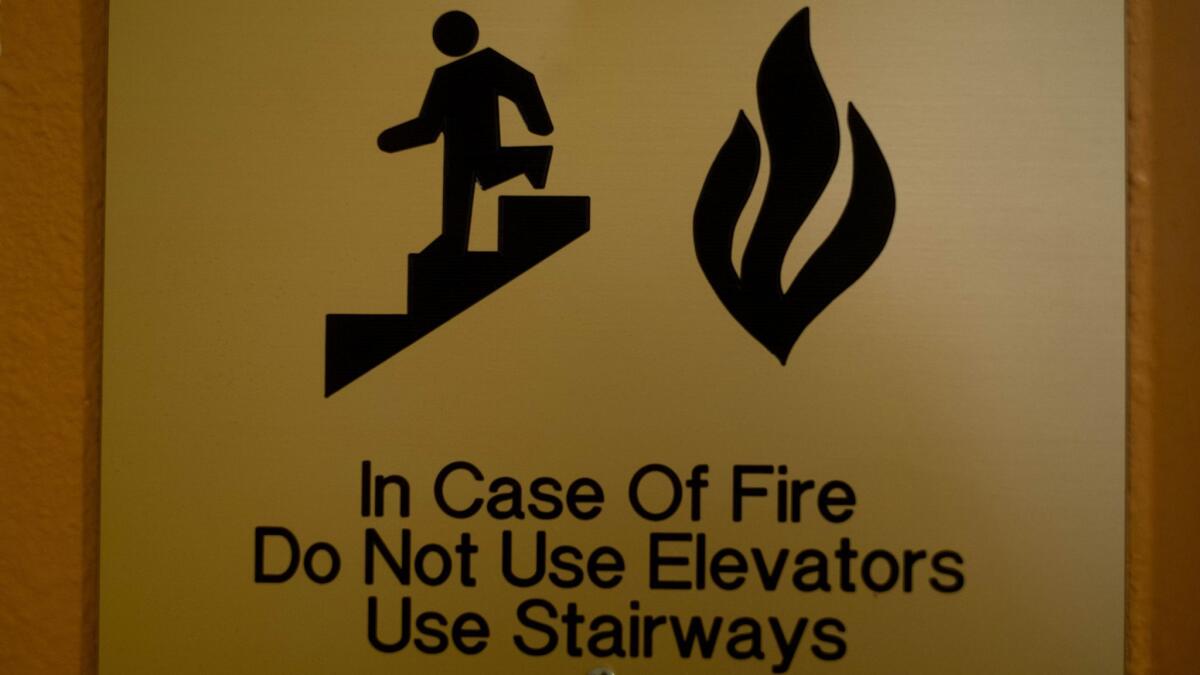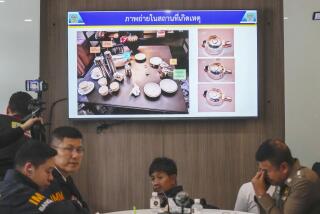Don’t live in fear of a hotel fire, but do plan as though your life could depend on it

Question: During the recent Christmas holidays, I spent two nights at the Encore hotel in Las Vegas. A beautiful property, and the amenities are over the top. But I didn’t notice any fire sprinklers in my room. Shouldn’t newer hotels (Encore opened in December 2008) be required to have them? I did see smoke alarms, but I doubt that they would be enough in the case of a fire. Am I missing something?
David Tulanian
Las Vegas
Answer: Tulanian may have missed them, and you can probably blame that on aesthetics.
But first, to Tulanian’s question. Michael Weaver, a spokesman for the property, said in an email, “All of our rooms are equipped with sprinklers and smoke detectors. It is required by law.”
Why Tulanian may not have seen them became clearer in an interview with Charles Carroll, a senior vice president for Idemia, a company that specializes in security.
By coincidence, he was staying at the Encore during a visit to the recent Consumer Electronics Show, so I asked him whether he could see sprinklers in his room.
He could, he said, and he texted me photos of the sprinklers, which were almost indistinguishable from the ceiling.
These sprinklers don’t look like the metal spider-like devices, known as pendant sprinkler heads, which are most common, according to a blog by Fireline, a Maryland fire equipment distributor.
Instead, flat disks, called concealed pendant heads, are “recessed into the ceiling and covered with a decorative cap to make them blend into your ceiling,” the blog said.
“While it may seem like the cap could get in the way of the fire protection aspect, this cap is specifically designed to fall away … [before] the activation of the sprinkler system. Once the sprinkler head is activated, it will drop down from the ceiling and the water is dispersed.”
Which is probably more than anyone who is not in the business of protection wants to know about sprinklers.
But they’re an important part of the safety package — a package of which travelers must be increasingly aware, Carroll said.
“Everybody has to understand that they have to take control of their own safety and … security,” said Carroll, formerly a police officer who has spent his career in protection.
That doesn’t mean you don’t follow instructions if there is a fire in your hotel. But you also do some homework to ensure you have the information you need to save your life, and you can start at check-in, said Annmarie Feeley Jones, a senior risk specialist with Chubb Insurers.
Hotels will usually have an alarm system, but do you know what it sounds like? Is there a loudspeaker system that will give instruction? Ask these questions at the front desk and tuck the answers your mental file.
After you settle in your room, check the escape route, which is usually posted on the back of your room’s door. Then go find the nearest exit, she said, and as you are doing so, count the number of steps between your room and that exit door.
Make sure the exit door is unlocked, and if it’s not, let the front desk know pronto because you will not be using the elevator.
Among Feeley Jones’ other rules to live by:
►Listen for instructions over a loudspeaker or by a human being.
►If you cannot get out of your room, wet towels and stuff them in cracks in the door.
►Turn off any fans or air conditioning.
►Call the fire department and let them know where you are.
►Stay by a window with a white cloth or flashlight (a smartphone flashlight app can be a big help) so you can signal.
►Grab your room key and your wallet, which you have thoughtfully left by the bed.
►Leave your shoes by the bed too so you can quickly find them.
To Feeley Jones’ ideas I would add this: Many years ago in the middle of the night, someone tried to break into my hotel room by breaking down the door. Fortunately for me, it was a metal door. Unfortunately for me, my next visitor was hotel security, and I wasn’t dressed to receive guests.
Since the night after this happened, I have stopped sleeping in regular night gear and started sleeping in knit pants or shorts and a T-shirt. This ensemble is presentable enough for appearing in public, whether it is to escape or to dash to the lobby to feed the need for caffeine.
The coffee craving is far more likely than a fire in a place that’s not a home, statistics show.
In 1977, 374,500 non-home fires killed 640 civilians, injured 4,670 and did $8.2 billion in damage in 2015 dollars, the year of the National Fire Protection Assn.’s report.
By 2015 those numbers had dropped to 136,000 fires, 125 deaths, 1,925 injuries and $3.3 billion in damage. (The report does not break out hotels.)
A good trend line, but until that number is zero, you must be on your guard for anything.
As the tragic events of Oct. 1 show, anything can happen in Las Vegas or anywhere else. Fifty-eight people were killed and more than 500 were wounded that night when a man opened fire on concertgoers from his room at Vegas’ Mandalay Bay.
Whether it’s a madman with weapons or a fire, staying calm is key. But how?
Mental preparation will provide information on how to make sound decisions, Carroll said. You know where the exits are; you know the exit door is open; you know which direction to go to move away from danger.
As with most things in travel — or life — you are your own best resource when things look grim, especially if you have a plan. With luck, you’ll never have to use it.
Too much trouble to scope out exits and such? No, it’s not. Make it a rule — a rule to live by.
Have a travel question or dilemma? Write to travel@latimes.com. We regret we cannot answer every inquiry.
More to Read
Sign up for The Wild
We’ll help you find the best places to hike, bike and run, as well as the perfect silent spots for meditation and yoga.
You may occasionally receive promotional content from the Los Angeles Times.







